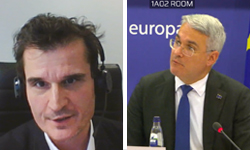BusinessEurope Headlines No. 2022-37
EU business needs additional measures on energy market to remain competitive

A stronger European response to the energy crisis is essential to prevent more companies from shutting down their production and to avoid an irreversible fragmentation of our unique energy market. This was the key message of BusinessEurope Deputy Director General Alexandre Affre at the International Workshop in Prague on 29 November, organised by the Confederation of Industry of the Czech Republic (SPCR). Speaking at a high-level panel with representatives of Czech Ministries and Swedish Enterprise, Affre underlined the need to consider additional emergency measures on the energy market to safeguard Europe’s global competitiveness. He noted the price differential between Europe and the USA, which puts European companies at significant disadvantage, and could result in permanent relocation of EU industry abroad. Read our recent letter on the topic here.
Contact: Agata Zalewska
New publication: Making Better Regulation work better for SMEs
 At the EU SME Assembly in Prague, BusinessEurope, Eurochambres and SMEunited presented their joint SME Test benchmark report “Making better regulation work better for SMEs”, which analyses the application of the SME Test across the European Commission services. Twenty-six impact assessments have been checked against the Commission’s own better regulation guidelines to assess whether and to what extent the SME Test, a mandatory tool in ensuring an SME-proofed regulatory regime, is carried out. The conclusions of our work provide a mixed picture. While better regulation principles have steadily grown in importance in the working procedures of the EU over the past two decades, the SME Test guidelines are still not applied consistently by all Commission services. To find out more about our findings and key recommendations, see our full report.
At the EU SME Assembly in Prague, BusinessEurope, Eurochambres and SMEunited presented their joint SME Test benchmark report “Making better regulation work better for SMEs”, which analyses the application of the SME Test across the European Commission services. Twenty-six impact assessments have been checked against the Commission’s own better regulation guidelines to assess whether and to what extent the SME Test, a mandatory tool in ensuring an SME-proofed regulatory regime, is carried out. The conclusions of our work provide a mixed picture. While better regulation principles have steadily grown in importance in the working procedures of the EU over the past two decades, the SME Test guidelines are still not applied consistently by all Commission services. To find out more about our findings and key recommendations, see our full report.
![]() Contact: Daniele Olivieri
Contact: Daniele Olivieri
Better alignment of trade and development policy is key for sustainability
 After a year-long consultation process, the European Commission unveiled its new approach to strengthen the implementation and enforcement of Trade and Sustainable Development (TSD) chapters of the EU's trade agreements on 22 June 2022. In its contribution to the public consultation on which the review was based, BusinessEurope had stated that TSD chapters contribute to a level playing field through binding commitments on labour, environmental, social, and human rights and they promote deep cooperation among Parties and members of civil society, incentivising compliance with international conventions and stepping up domestic engagement. Whilst the European Commission’s new approach to TSD now allows for applying trade sanctions in case of material breaches of the Paris Climate Agreement and the fundamental principles of the International Labour Organisation, the emphasis still lies on a results-oriented engagement with partner countries. This is important since often the governments of developing countries may often be willing but not able to duly enforce their relevant legislation. In these cases, a dialogue-based approach supplemented with capacity building and funding is best suited to improve the situation. Such a targeted use of development policy will be even more important in view of upcoming EU legislation, such as the corporate sustainability due diligence directive, the deforestation regulation, or the forced-labour ban. If this EU legislation is not flanked by development policy measures that empower the governments of developing countries to better enforce their labour, social and environmental regulations, doing business in many developing countries will become too risky for European companies. This would exclude countries from global value chains at a time when the efforts of European companies to diversify their supply chains could create new opportunities for them. A better alignment of EU trade and development policy will thus be key for achieving truly sustainable economic relations.
After a year-long consultation process, the European Commission unveiled its new approach to strengthen the implementation and enforcement of Trade and Sustainable Development (TSD) chapters of the EU's trade agreements on 22 June 2022. In its contribution to the public consultation on which the review was based, BusinessEurope had stated that TSD chapters contribute to a level playing field through binding commitments on labour, environmental, social, and human rights and they promote deep cooperation among Parties and members of civil society, incentivising compliance with international conventions and stepping up domestic engagement. Whilst the European Commission’s new approach to TSD now allows for applying trade sanctions in case of material breaches of the Paris Climate Agreement and the fundamental principles of the International Labour Organisation, the emphasis still lies on a results-oriented engagement with partner countries. This is important since often the governments of developing countries may often be willing but not able to duly enforce their relevant legislation. In these cases, a dialogue-based approach supplemented with capacity building and funding is best suited to improve the situation. Such a targeted use of development policy will be even more important in view of upcoming EU legislation, such as the corporate sustainability due diligence directive, the deforestation regulation, or the forced-labour ban. If this EU legislation is not flanked by development policy measures that empower the governments of developing countries to better enforce their labour, social and environmental regulations, doing business in many developing countries will become too risky for European companies. This would exclude countries from global value chains at a time when the efforts of European companies to diversify their supply chains could create new opportunities for them. A better alignment of EU trade and development policy will thus be key for achieving truly sustainable economic relations.
Contact: Benedikt Wiedenhofer
Due diligence: we need 1 model instead of 27
 Having more proportionate and harmonised due diligence rules is the way to make them manageable for big companies and bearable for smaller companies. The approach taken in the original European Commission proposal does not allow for sufficient harmonisation, what will cause a fragmented internal market. Business calls on the legislators in the European Parliament and the Council of the EU who are now working on the corporate sustainability due diligence proposal to preserve the legal certainty and competitiveness of EU companies when fine-tuning the future rules. These messages were expressed by Bruno Zabala, Chair BusinessEurope’s Company Law Working Group at the European Corporate Governance Conference in Prague on 29 November.
Having more proportionate and harmonised due diligence rules is the way to make them manageable for big companies and bearable for smaller companies. The approach taken in the original European Commission proposal does not allow for sufficient harmonisation, what will cause a fragmented internal market. Business calls on the legislators in the European Parliament and the Council of the EU who are now working on the corporate sustainability due diligence proposal to preserve the legal certainty and competitiveness of EU companies when fine-tuning the future rules. These messages were expressed by Bruno Zabala, Chair BusinessEurope’s Company Law Working Group at the European Corporate Governance Conference in Prague on 29 November.
Contact: Oliveira Pedro
Improving the performance of labour markets and social systems
 The European semester has a key role to play to actually bring Europe forward on its path of economic and social convergence. There are two main ways in which to improve the performance of labour markets and social systems through the European semester processes. The first is to further develop benchlearning between Member States. For example, a key priority is to address the crucial challenge of speeding up the updating of training curricula and qualifications to the changing jobs in the context of the twin digital and green transition. Second, strengthening tripartism is another key priority to design national employment and social policies, reforms and investments in a way which appropriately reflects the views of national social partners taking into account the key role they play to regulate the labour markets through collective bargaining and to finance social protection systems. These were the key messages by Maxime Cerutti, Director of Social Affairs, at the joint meeting of the Council’s Employment Committee (EMCO) and Social Protection Committee (SPC) that was held on 29 November.
The European semester has a key role to play to actually bring Europe forward on its path of economic and social convergence. There are two main ways in which to improve the performance of labour markets and social systems through the European semester processes. The first is to further develop benchlearning between Member States. For example, a key priority is to address the crucial challenge of speeding up the updating of training curricula and qualifications to the changing jobs in the context of the twin digital and green transition. Second, strengthening tripartism is another key priority to design national employment and social policies, reforms and investments in a way which appropriately reflects the views of national social partners taking into account the key role they play to regulate the labour markets through collective bargaining and to finance social protection systems. These were the key messages by Maxime Cerutti, Director of Social Affairs, at the joint meeting of the Council’s Employment Committee (EMCO) and Social Protection Committee (SPC) that was held on 29 November.
Contact: Anna Kwiatkiewicz
EU should focus on how to improve traineeship provision, not on new legislative action
 Traineeships provide young people with useful work experience to access the labour market. The purpose of a traineeship is to provide the skills that will increase an individual’s employability and enhance their employment prospects. As such, all traineeships can be viewed as part of the learning experience. This was among the key messages given by Maxime Cerutti, Director of Social Affairs, during an exchange with the European Parliament Employment Committee on 30 November. Better data on traineeships, especially open market ones, is needed to usefully take stock of the 2014 European Quality Framework on Traineeships. BusinessEurope underlines the relevance of the existing framework in the form of a Council Recommendation. A stronger legislative approach would discourage employers from providing valuable traineeship opportunities to young people. Traineeships are also not an issue that lends itself for an EU directive.
Traineeships provide young people with useful work experience to access the labour market. The purpose of a traineeship is to provide the skills that will increase an individual’s employability and enhance their employment prospects. As such, all traineeships can be viewed as part of the learning experience. This was among the key messages given by Maxime Cerutti, Director of Social Affairs, during an exchange with the European Parliament Employment Committee on 30 November. Better data on traineeships, especially open market ones, is needed to usefully take stock of the 2014 European Quality Framework on Traineeships. BusinessEurope underlines the relevance of the existing framework in the form of a Council Recommendation. A stronger legislative approach would discourage employers from providing valuable traineeship opportunities to young people. Traineeships are also not an issue that lends itself for an EU directive.
Contact: Robert Plummer
The future of corporate taxation
 The EU should refocus its work on corporate tax to ensure it remains a competitive place for businesses to invest in when compared to other major economic players. This was the key message of Stefan Pan, Vice-President of BusinessEurope from Confindustria, during a panel discussion on the future of corporate taxation at the EU Tax Symposium, organised by the European Commission on 28 November. Businesses continue to support a global tax agreement but need simpler, more efficient, and predictable tax regimes to incentivise long-term investment. In addition, introducing unilateral and diverging implementation of digital and minimum tax rules within the EU risks fragmenting the Single Market, undermining the fundamental freedoms, and jeopardising European competitiveness. A competitiveness check of tax instruments would be welcome to avoid introducing rules that are too difficult to administer in order to help businesses be more innovative, productive and committed to the societies we live in, but also to improve the efficiency of tax administrations that require more resources to grasp new international standards.
The EU should refocus its work on corporate tax to ensure it remains a competitive place for businesses to invest in when compared to other major economic players. This was the key message of Stefan Pan, Vice-President of BusinessEurope from Confindustria, during a panel discussion on the future of corporate taxation at the EU Tax Symposium, organised by the European Commission on 28 November. Businesses continue to support a global tax agreement but need simpler, more efficient, and predictable tax regimes to incentivise long-term investment. In addition, introducing unilateral and diverging implementation of digital and minimum tax rules within the EU risks fragmenting the Single Market, undermining the fundamental freedoms, and jeopardising European competitiveness. A competitiveness check of tax instruments would be welcome to avoid introducing rules that are too difficult to administer in order to help businesses be more innovative, productive and committed to the societies we live in, but also to improve the efficiency of tax administrations that require more resources to grasp new international standards.
Contact: Mariella Caruana
Business proposals for a workable EU forced labour ban
 On 30 November, BusinessEurope submitted its feedback to the European Commission on its proposal to ban products made by forced labour from the EU market. Forced labour is a serious human rights violation, fully condemned by the European business community. In this regard, we generally welcome the Commission’s proposal. However, we believe that there are areas that need to be further clarified or that raise concerns when it comes to ensuring an effective and harmonious implementation of the measures. In our feedback, we raise the following points in particular: 1) it is important to clarify the relationship of the forced labour ban proposal with other EU legislative initiatives, such as the Corporate Sustainability Due Diligence Directive. This includes clarity on the obligations of economic operators; 2) it must be ensured that the proposal does not undermine the architecture of free movement of goods in the Single Market and that the investigation process conducted by national competent authorities is better streamlined; 3) as forced labour is a global challenge, international cooperation is critical and the EU should do more to explain its proposal to trading partners and promote the use of instruments developed by organisations such as the International Labour Organisation (ILO). BusinessEurope remains committed to the debate as the legislative process unfolds.
On 30 November, BusinessEurope submitted its feedback to the European Commission on its proposal to ban products made by forced labour from the EU market. Forced labour is a serious human rights violation, fully condemned by the European business community. In this regard, we generally welcome the Commission’s proposal. However, we believe that there are areas that need to be further clarified or that raise concerns when it comes to ensuring an effective and harmonious implementation of the measures. In our feedback, we raise the following points in particular: 1) it is important to clarify the relationship of the forced labour ban proposal with other EU legislative initiatives, such as the Corporate Sustainability Due Diligence Directive. This includes clarity on the obligations of economic operators; 2) it must be ensured that the proposal does not undermine the architecture of free movement of goods in the Single Market and that the investigation process conducted by national competent authorities is better streamlined; 3) as forced labour is a global challenge, international cooperation is critical and the EU should do more to explain its proposal to trading partners and promote the use of instruments developed by organisations such as the International Labour Organisation (ILO). BusinessEurope remains committed to the debate as the legislative process unfolds.
![]() Contact: Bournou Sofia, Jan Rempala
Contact: Bournou Sofia, Jan Rempala
Calendar 
- 6 December: EU-Western Balkans summit
- 14 December: EU-Philippines Business Roundtable
- 16-20 January: World Economic Forum 2023
Not yet a subscriber? Register here.
Reminder: please have a look at our privacy policy